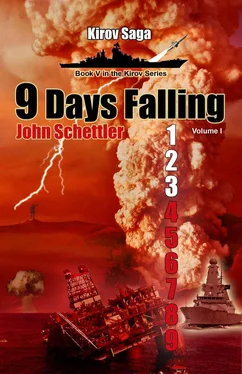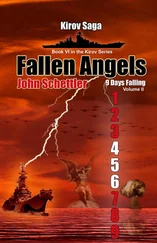The strike groups began their run up the Mediterranean coast, then turned East, flying low over Syria. With massive jamming and software attacks unleashed by the IDF, Syrian Air defense response was simply too slow, and the fledgling government there after Assad’s fall years earlier was too reluctant to pick a fight with Israel in any case. The few anti aircraft missile batteries that managed to acquire Israeli targets were quickly extinguished from the grid as their radars fell prey to the AIM “Harm” anti-radar missiles. The strike groups were out of Syrian airspace in a flash, but even though the Iranians had been forewarned, there was little their own air defense could do about the attack.
The Israeli F-15 top cover swept aside the few remaining Iranian aircraft aloft to contest their approach, and the F-16s went to work. As night fell the moon was just off full and targets would soon begin lighting up the deepening dusk, their heavy laser and GPS guided ordinance pummeling the industrial heart of the Iranian nuclear program, at least those facilities that were known. The Israeli’s were meticulous, and went after any known ballistic missile sites as well, though they knew they would be faced with a perpetual duel with mobile systems in the coming weeks.
Unable to prevent the attack, or hinder it an any way, the Iranians had a precious few minutes to consider reprisals. They could order a massive retaliatory strike, in keeping with the rhetoric of their own government in recent months, and “severely punish any aggressor who would dare to threaten or strike the Iranian homeland.” But the Israelis were already finding and extinguishing a good number of the fixed Shahab missile sites. If they were to launch a counterattack, it had to be soon. Alternatively, they could stand down, ride out the storm, then take the role of the aggrieved victim and raise hell in the UN and every other international forum available. The scene the previous week in the UN with the Chinese, Japanese, Taiwanese and Americans all exchanging accusations and threats did little to convince them the diplomatic route would prove fruitful. The attack on Princess Royal , would also stand as a flagrant violation of international law, and serve as an all too visible and obvious provocation.
Their third option was to take the conflict "international" and make the world suffer the consequences. The Straits of Hormuz and the oil rich Sheikdoms to the south were the most inviting and easily ignited targets a ballistic missile commander might ever have. They still had time to draw the sword of Islam and make their reprisal before the second wave of Israeli planes went after their missile sites.
The Iranians had made up their minds.
At a little after 22:00 hours, Gulf time, the first wave of missiles left their launch pads. The Israelis had found, and destroyed, sixteen launching sites, those deemed most likely to harbor weapons packages that might be aimed at Israel. But the Iranian response had a far greater scope, taking in the full range of the target rich southern shores of the Persian Gulf. The oil storage bunkers and terminals at Al Fujairah, the world's third largest bunkering center, were among the many targets they had decided to strike, and the list was long.
Missiles were falling at the export terminals of Ras Tanura, Ras al-Ju'aymah and the industrial city of Al Jubayl in Saudi Arabia. The American facilities in Qatar were struck that night as well, along with the ports at Abu Dhabi, and a host of other key facilities along the coast. If the Iranians could not have atomic energy, the world would not have petroleum. The equation was quite simple. And added to the catastrophe already underway in the Gulf of Mexico, it would mark the end of modern life as so many had lived it for the last hundred years.
Assad al Arif watched amazed from his makeshift sasha, a palm frond fishing canoe bobbing at the end of its mooring rope a few miles south of the main oil storage facilities at Al Fujairah. He had been out all day, fishing as his father and grandfather before him, and now was simply tending and mending his nets in the quiet evening. Then the horizon to the north exploded in fury and red orange flame. An Iranian Shahab had struck the ENOC oil terminals there, igniting an inferno of burning oil and gas as one storage tank after another was engulfed in the holocaust of fire.
From far more plush accommodations in the city itself, the ruler of Fujairah, His Highness Sheikh Hamad bin Mohammed Al Sharqi, and His Excellency Sheikh Hamad bin Saif Al Sharqi, his deputy, watched in horror as the oil storage bunkers burned out of control. Millions of barrels of oil would be consumed in a conflagration that sent massive clouds of broiling smoke aloft to further char the black night settling over the Straits of Hormuz.
Two of the world’s top five oil producing regions were now awash in flood and fire, and the third, and the newest and biggest in the Caspian region was now more vital than ever. The fires of rival clan contention in Kazakhstan were burning closer and closer to the massive Kashagan superfields. And massing on the northern border, the Russian Army sat like a hungry wolf waiting to spring on its prey.
“And so it begins,” said one Sheikh to another. The long feared “incident” in the Persian Gulf had finally ignited the well oiled kindling there, and the fires were burning.
“No my friend,” said the able deputy to his Highness. “And so it ends…”
“Loud rings the travail of those hands that first created war, the scourge of all the earth. For ere they dragged unknown iron from its stony bed and provided swords, Hatred roamed feeble and unarmed, Anger was resourceless, and Revenge slow.”
~
Argonautica Book 5 , Translated By J. H. Mozley
The newswent from bad to worse on Medusa platform that morning. Mudman had been monitoring the video and radio coverage out of Busachi where pump stations and corporate offices sat amid a field of storage tanks and piles of ling, black reserve oil pipeline.
“Hey Flackie,” he called, pulling out his ear bud for a moment and lowering the volume. “We got us a hurricane now.”
“What are you talking about Mudman?” Ben Flack was in no mood for more bad news. “That’s old news. I’ve had Richmond on the phone all morning yammering about shortfall in the Gulf of Mexico. They lost some real big platforms out there.”
“No—right here ,” Mudman pointed to his TV screen. “Those bastards at MECCA are calling for a major uprising. Calling it Hurricane Barbarossa or some shit. Named it after some damn Turkish Muslim Pasha. Even got old Azul Abar on board with them.” Azul Abar was a notorious militant gangster/terrorist in the Region, and head of incipient insurgent group known as the Caspian Region Volunteer Force. He began playing the news feed from his monitor: “About 0100 Hrs, today ‘Hurricane Barbarossa’ commenced with heavily armed fighters in hundreds of units filing out from different MECCA bases across the Caspian Region in solidarity to carry out destructive and deadly attacks on the oil industry in the Kazakh state.”
Apparently the militants had made good on their claims, blowing up a big Shell pipeline and reportedly razing nearby facilities. Several Shell employees were thought to have been killed in the incident. “The foolhardy workers and soldiers who did not heed our warning perished inside the station.” The statement was being made by a MECCA colonel on the scene.
Mudman reached for the volume, turning it up a notch so Flack could hear better. The spot continued with a countervailing government spokesman: “There is no war in the Caspian Region.” It was the Caspian information minister. “The oil war propaganda is just a gimmick by the militants to create fear in every law-abiding citizen, both local and foreign alike, and to provoke tension in the polity. We are not aware of their antics and capabilities. The joint task force in place is very capable of containing the indiscretion of the militants. So there is nothing like war. The Kazakh government has been trying a combination of dialogue, consultation, and development of the region and, after consultation, we created a dedicated ministry to address these issues.”
Читать дальше












